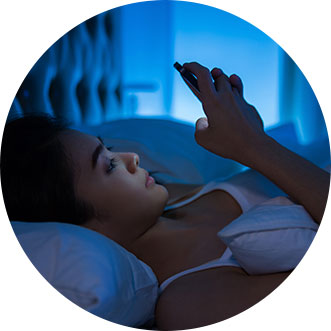How Technology is Ruining Your Sleep
Let's get the basics
We know, we know, everything in our world today is ‘smart.’ Smartphones, smart houses, even smart mattresses (like the Propel Hybrid by Brooklyn Bedding). Technology is everywhere we turn, so why shouldn’t it be in the bedroom?
According to the National Sleep Foundation, at least 90% of us use technology in the hour before we hit the hay. While that episode of Friends you’ve seen a million times might make your eyes droopy, there are consequences that run much deeper. The quality of your life can take a serious hit from your nighttime habits.
As much as we don’t want to admit it, screens mess with our brains. According to South Australian sleep researcher, Dr. Sarah Blunden, “Sleep is the foundation of all physical and mental health.” The regular use of electronic devices, especially in the hours before bed, impacts how much sleep you get, and how restorative that sleep is. In turn, our energy may be down, moods less stable, and thinking less sharp the next day. So what it is about technology that affects us? And how can we put a stop to it?

Blue Light
That infamous blue light. In the past year or so awareness of the type of light emitted by most electronic devices (phones, tablets, televisions, computers) has become much more prevalent. Blue light is the strongest and brightest wavelength of light. It also has the strongest effect on us before we snooze. When our brains sense blue light, we perceive it as sunlight. Our body assumes it’s still daytime and our melatonin production remains low. Melatonin regulates our sleep-wake cycle, so the longer our brain delays its production, the harder it is to fall asleep and stay asleep.
Changing that blue light can go a long way toward helping you get better rest. Some devices automatically come with a way to do that built right into the technology. For other options, you can download free apps that will reduce the dreaded blue light.

Unexpected Noises
From texts to calls to Facebook notifications, we can all recall a time when a noise from our phones woke us up. One-fifth of Americans actually go to sleep with their phone ringers on, hearing every noise, every night. Even if we can’t remember hearing these pings and dings, they startle our minds. We may be more likely to wake to sounds connected to our mobile devices than we are to other noises as well. Considering we spend all day conditioned to jump and check our phones upon any noise or notification, it comes as no surprise we still respond in our sleep, even if it’s subconsciously.


Overstimulation
All sorts of activities—scrolling through social media, playing Candy Crush, replying to an email, turning on the TV—stimulate the brain, and release adrenaline. When this happens, it can be almost impossible to get to sleep. If it becomes a habit, your brain can consequently start to associate that stimulation with bedtime.
Your body then reacts to this stimulation by increasing cortisol levels and delaying that all-important melatonin production. All this ends up preventing you from the crucial wind-down time that lets you relax and fall asleep.

Distraction
It's important that TV time, phone time, and bedtime don't overlap. It's well-known that phones and Netflix are addictive. With most people bringing their phones into the bedroom, and 64 percent of people stating they have televisions in the bedroom, it’s a small wonder we’re sleep deprived.
When including these devices in your bedtime routine, you’re filling your mind with information, knowledge, and thoughts. You're even experiencing micro-arousals from the flickering of the TV. It may seem harmless but, by keeping your mind engaged, technology can trick your brain into thinking that it needs to stay awake.

How to Fix
It may be hard to run from technology in our modern age but, with a few simple changes, we can avoid letting our electronics ruin our crucial sleep time. Sleep experts recommend removing technology from the bedroom completely, to help your body associate your bed with sleeping, and nothing else.
At least an hour before you plan for your head to hit the pillow, turn those phones, TVs, and iPads off, or leave them outside of the bedroom. In your time just before bed have other activities planned, like reading, tidying up, or taking a shower. If you must have your phone in the room, be sure to turn off those notifications or put your phone in do not disturb mode.
After spending an entire day surrounded by technology, it’s truly time to disengage. Give your body—and your brain—a chance to rest and rejuvenate.
